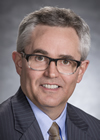
Matthew R. Larson, Candidate for President-Elect
Position: K–12 curriculum specialist for mathematics, Lincoln (Nebraska) Public Schools (1995–).
Education: B.A. (history, mathematics minor; secondary mathematics certification), M.Ed. and Ph.D. (curriculum and instruction), University of Nebraska–Lincoln (UNL).
Previous Experience: Instructional coordinator (1994–95) and mathematics department chair (1991–95), Lincoln (Nebraska) High School; mathematics teacher, Lincoln (Nebraska) Public Schools (1987–2000); visiting associate professor (honorary), Teachers College, Columbia University (2008); adjunct professor, College of Education and Human Sciences (2008) and instructor, department of mathematics, (1988–89, 1994–95), UNL.
Memberships: NCTM, National Council of Supervisors of Mathematics, TODOS: Mathematics for All, Benjamin Banneker Association, Association of Mathematics Teacher Educators, American Educational Research Association, ASCD, Nebraska Association of Teachers of Mathematics.
Activities in NCTM: Member: Board of Directors (2010–13); Principles to Actions writing team (2013–2014); Executive Committee (2011–13); Educational Materials Committee (2010–13); Committee on Capital Projects (2012–); Research Agenda Planning Committee (2007); Linking Research and Practice Task Force (2004–05); chair (2013) and member (2010–13), Budget and Finance Committee; chair (2006–07) and member (2004–07), Research Committee; co-leader, Teaching Working Group, Research Agenda Conference Planning Committee (2008).
Other Activities: UNL Center for Science, Mathematics, and Computer Education: member, Management Team, NSF-MSP Grants (Math in the Middle, NebraskaMATH, NebraskaNOYCE) (2005–).
Publications: Author, Administrator’s Guide: Interpreting the Common Core State Standards to Improve Mathematics Education (NCTM 2011); coauthor: Beyond the Common Core: A Handbook for Mathematics in a PLC at Work Series (NCTM and Solution Tree 2014); Common Core Mathematics in a PLC at Work Series (NCTM and Solution Tree 2012); K–12 Mathematics Programs (Houghton Mifflin Harcourt 2002–). Numerous other publications.
Honors: 1994 U.S. West Outstanding Teacher Award
Statement: NCTM faces two significant challenges: Growing while retaining membership, and regaining its position as the “go-to” authority on mathematics education issues. My goals as president of NCTM are threefold:
- Increase and improve the quality, diversity, and delivery platforms of NCTM professional development offerings to enhance members’ access to mathematics content and effective instructional practices.
- Increase NCTM’s engagement in public and political advocacy for high-quality teaching and learning of mathematics.
- Increase and sustain the membership of NCTM.
To support these goals and NCTM’s strategic priorities, the Council should undertake two initiatives. First, NCTM must develop a specific and coherent professional development plan to support teachers’ implementation of effective instruction and assessment practices. Improving the mathematics learning of all students while simultaneously addressing learning differentials includes, but is not limited to, supporting the implementation of the Common Core State Standards for Mathematics. The foundation for achieving improved teaching and learning is outlined in Principles to Actions: Ensuring Mathematical Success for All. NCTM must create new professional development options, emphasizing effective leverage of cutting-edge technology, specialized preconference offerings, on-demand professional development options, and other online opportunities with planned follow-up. Enhanced professional development support will support deep implementation of the practices outlined in Principles to Actions, ensuring that mathematics works for all students and positions NCTM as an invaluable resource to the membership. Second, NCTM must develop partnerships to assist in launching a campaign to place NCTM at the forefront of improving the public’s perception of the importance and accessibility of mathematics, as well as generate support for high-quality mathematics curriculum, instruction, and assessment practices.
I have had the incredible opportunity to work with school districts and teachers in nearly every state. These diverse experiences have afforded me a national perspective on the issues facing mathematics teachers in urban, rural, and suburban settings. I will bring to the presidency a lifelong commitment to mathematics education and experience working with nearly all stakeholders in K–12 and postsecondary mathematics education. Most important, I bring the experience of an educator who has spent his career in K–12 mathematics education in a public school district—I live, work, and understand the issues and challenges mathematics teachers face on a daily basis.